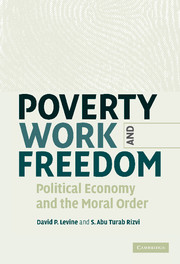6 - Creativity and freedom
Published online by Cambridge University Press: 22 September 2009
Summary
Introduction
In Chapter 5, we considered the importance of the ideas of will, self, and identity. We suggest that the idea of will links what we do in the world to a creative act originating in the mind, which is the activity of imagining a world, or of conceiving an idea of a world, as it might be. The link between will and imaginative construction makes creativity a central element in our conception of work and its relation to freedom. We turn now to a fuller discussion of creativity so that its implications for work and poverty will become clearer.
A natural point of departure for doing so might lie in the common quality of work and creativity, which is that they are meant to produce something. Indeed, the term creativity is simply an extension of the term “to create”, which is something we imagine that working will also accomplish, if not always in the same sense. Yet, even though the two activities are linked in this way, we will begin not with the production of something, but with the prior mental act, which is the conception of what might be produced. Creativity begins not in the hands but in the mind, which means that all creativity in conduct, including creativity in work, begins with creative thinking, or at least with the creative mental process.
Thinking without presuppositions
Creativity in thinking refers to that quality of thinking that takes it out of already known channels.
- Type
- Chapter
- Information
- Poverty, Work, and FreedomPolitical Economy and the Moral Order, pp. 66 - 77Publisher: Cambridge University PressPrint publication year: 2005

